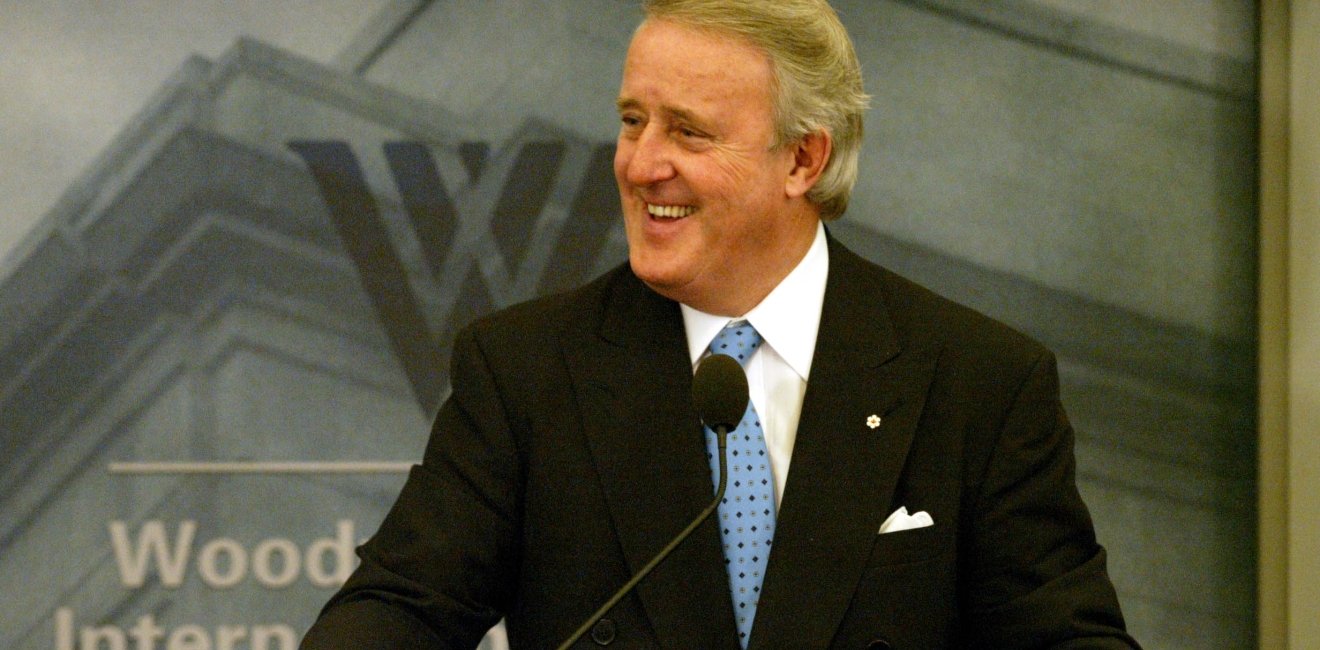Lessons in Civility: Brian Mulroney and Canada's Warm Farewell
Andrew Cohen, Canada Institute Global Fellow, reflects on Canada's gratitude toward its leaders in the wake of former Prime Minister Brian Mulroney's passing.
Andrew Cohen, Canada Institute Global Fellow, reflects on Canada's gratitude toward its leaders in the wake of former Prime Minister Brian Mulroney's passing.

“Brian Mulroney, the last great prime minister,” declared The Globe and Mail in its lead editorial shortly after his death. The newspaper was right, but in judging their leaders, Canadians rarely see greatness.
Unlike the United States, Canada has no cult of leadership. To be prime minister is not to be president; the difference is more than the powers of the office. It is a matter of perception. We do not venerate, canonize or deify our prime ministers – or anyone else for that matter. In a country suspicious of superlatives, politicians are treated in comparatives.
Canadians are prudent, restrained and moderate, a people author Peter C. Newman once called “more a nation of life-insurers than risk-takers.” It makes us slow to embrace celebrity or honor success. We view politicians with skepticism and distrust, though we care little about their personal lives and respect their privacy.
Since his passing February 29, Brian Mulroney has found a new stature among Canadians. He has achieved in death what he could not in life: a level of nostalgia, respect, admiration, warmth, even affection.
He always wanted to be loved – this unabashedly sentimental Irish chieftain – and to hear and read the tributes, paeans, and encomiums, he is. Even former rivals shower him with praise. While this may be common in the United States , it isn’t in Canada.
Death does this. Canadians may elect and re-elect our leaders, often for three consecutive terms. We may give them a decade or more in office. But then, predictably, we tire of them.
Rarely do we love them, the way Americans loved George Washington, Abraham Lincoln, Franklin Roosevelt, John F. Kennedy, and Ronald Reagan.
Usually, by the time our prime minsters leave – willingly or unwillingly – we heartily dislike them. We cannot wait to get rid of them. And then, as former leaders, often of the same party, they loathe each other. There is no comity or clubbiness among former prime minsters as there is among former presidents. This animosity is very Canadian.
Canadians, for example, once called Liberal Prime Minister Louis St-Laurent “Uncle Louis.” They gave him majority governments in 1949 and 1953. By 1957, though, they’d had enough and dismissed him, avuncularity notwithstanding.
When Lester Pearson succeeded him as party leader and triggered an election in 1958, John Diefenbaker’s Conservatives won the largest mandate in Canadian history. Dief was wildly popular – for awhile. Yet by 1962, Canadians soured on him, too, reducing his massive majority to a minority before ousting him in 1963. He had squandered his goodwill.
Pearson, who became prime minister, was refined and renowned as a former diplomat and Nobel Laureate. He gave the country its own flag and expanded the social welfare state in the most productive minority parliament in Canada’s history. By 1968, he was gone, too, seen as bumbling, inept and tinged with scandal. Now, alas, he’s considered a great prime minister.
Pierre Trudeau, his intellectual, avant-garde successor, rode “Trudeaumania” to a majority in 1968. He entrenched official bilingualism and, against the odds, freed Canada’s constitution from British trusteeship with a Charter of Rights and Freedoms. It was the single greatest act of statesmanship in Canada’s history.
After 16 years in power, he was called arrogant and aloof and loathed in western Canada for his National Energy Program. His Liberals, under John Turner, suffered their worst defeat since 1958. Still, forty years after he left office, Trudeau, like Pearson and St. Laurent, is a great prime minister.
And so we come to Brian Mulroney. He won consecutive majorities in 1984 and 1988. By 1993, he was reviled and historically unpopular. In the national election that year, his Progressive Conservatives were reduced to two members, and the party never recovered. He was pilloried as the author of failed constitutional reforms, the father of a national sales tax, and the subject of personal scandal.
And today? Historians rank him among the five great prime ministers of post-war Canada.
The lesson: much as we disliked and discarded them all in their time, we remember them more fondly after they leave. It is as if, in death, when the coast is clear, our gnarled souls are free to be kind. We are emboldened to say nice things, however unnatural.
From Mulroney’s greatest rivals – Preston Manning, Jean Chrétien, Lucien Bouchard – have come expressions of affection beyond the stock civilities dutifully issued on someone’s death. They recall Mulroney’s get-well cards, his congratulatory telephone calls, his grace notes. So do parliamentarians, journalists and others.
In Bouchard, it is staggering. Mulroney felt so betrayed by Bouchard, a member of his cabinet who quit over the Meech Lake Accord, that he famously told friends if Bouchard came to his funeral “to stop the music” and see him out.
But there was Bouchard, too, joining Chrétien and Manning in lauding Mulroney, remembering the depth of their friendship and the power of forgiveness. It was all so unCanadian.
Could Canada be changing, then? Could Brian Mulroney be the reason? If so, his civility, empathy and generosity in politics, before and after, may be the greatest legacy of a great prime minister.


The mission of the Wilson Center's Canada Institute is to raise the level of knowledge of Canada in the United States, particularly within the Washington, DC policy community. Research projects, initiatives, podcasts, and publications cover contemporary Canada, US-Canadian relations, North American political economy, and Canada's global role as it intersects with US national interests. Read more



